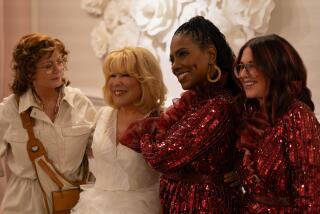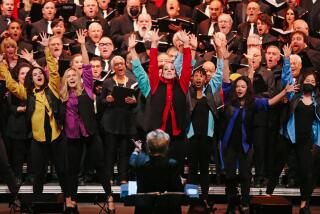A Heavenly Anonymous 4, Anonymous No More : Music: The group’s albums have been hits on classical music charts. Although compared to angels, members also sound a bit Beatles-esque.
- Share via
NEW YORK — Heaven is in a bad neighborhood: There’s barbed wire, and you have to buzz to be let in. Handcuffs dangle from the belt of the security guard at the front desk.
Heaven, in this instance, is St. Michael’s Church, a haven of unexpected beauty and serenity on a stretch of the Upper West Side favored by the drug trade. More accurately, heaven is the way the UCLA Center for the Performing Arts is advertising the sound of Anonymous 4, the four women who sing medieval music a cappella as a resident ensemble at St. Michael’s. They will appear in two different programs Saturday night and Sunday afternoon at Westwood United Methodist Church.
Heaven, moreover, must be something like what the members of Anonymous 4 feel they are in these days. The quartet is successful beyond the wildest dreams of these former New York free-lancers who used to eke out a living singing in various early-music groups around the city. They now belong to what Chamber Music Magazine calls the “hottest vocal quartet the recording business has seen since the Beatles.” However hyperbolic that claim may be, each of the three Anonymous 4 recordings on Harmonia Mundi has, indeed, gone straight to the top of the Billboard classical music charts. And the women are surely a little tired, by now, of being compared by critics to angels, even if they do sing like them.
Surprisingly, there actually is something just a little bit Beatles-esque about the quartet. The closeness of range of the three sopranos and one alto voice has some of the same sweetness of the Beatles’ falsetto close harmonies. And there is even a hint of the Beatles’ puckish humor in the women’s give-and-take among themselves. As the group was finishing up a rehearsal recently, the musicologist of the group, Susan Hellauer, asked for “tempo giusto,” and Johanna Rose quipped, “You mean tempo orange juice-sto.”
The enormous popularity of Anonymous 4--the moniker is musicologists’ name for an anonymous 13th-Century Englishman who wrote about the vocal polyphony he heard at the Cathedral of Notre Dame--is, it would seem, curious at best. Although the 9-year-old group sings chant, along with early polyphony, it is tied only marginally into last year’s rage for chant, which resulted from a marketing blitz.
“We ignore the whole issue of the chant phenomenon,” Rose says, in an interview after the rehearsal (the rest of the members scatter; Hellauer goes to walk her dog, who growls menacingly as a sign of affection). “We were there before it, and we will be there after it.” Her reaction has less to do with the music of chant itself than the shameless way it has been marketed.
In fact, one of the attractions of Anonymous 4 may well be the way the women combine the most ethereal of music making with occasional earthy humor and even a touch of irreverence, all of which brings them closer to the spirit of the Middle Ages than are many of the purely musicological performers or the monks. And they do this by making programs, generally around an hour in length, without intermission with a structure that offers insight into the period and the music.
For instance, in the program “Love’s Illusion”--which will be performed Sunday afternoon in Westwood and repeated Monday night at the Barclay Theater in Irvine and Tuesday night at University Theatre of the UC Riverside campus--13th-Century chansons and motets of courtly love will be interspersed with readings from the period.
One of them is a nutty legend about a knight whose trials to win his lady love has, as Rose describes it, “a lot of the feeling of Monty Python. This really illustrates the element of the absurd, and to me that’s appropriate, especially in relationship to the texts.”
“Courtly love texts are usually, ‘Oh, you’re so blond; I’m dying of love,’ and that’s about it. But this brings up the question about what courtly love was and whether it actually existed, since the rules for courtly love are that love has to exist outside of marriage.”
The music of courtly love--which is also the subject of the group’s latest CD--is equally extraordinary. Many of these motets feature three different musics and three different texts performed simultaneously. And although this is not music traditionally sung solely by women, there is something about the pure, high voices of these singers that helps clarify the lines.
Some of their distinctive qualities may stem from the fact that the four have very different backgrounds. Hellauer, who does most of the research for the programs, worked toward a doctorate in musicology; Rose has a master’s degree in early-music performance; Marsha Genensky was a folk singer and student of folklore and Ruth Cunningham is an accomplished Baroque flutist.
But still the trademark of Anonymous 4 is the sheer unity of sound, the kind of thing that is typical of the program of an English Ladymass, a medieval Mass in honor of the Virgin Mary, which includes much close singing. Rose admits that it is this close singing that is also the most rewarding for the performers, and is probably what really explains the otherworldly beauty of their singing and probably the real reason for selling as many recordings as they do.
“When you work very concentratedly with the same people and the same kind of voice, in music where we cross over each other a lot or where we’re singing chant, which is basically unison singing, it’s a real experience of being more than yourself, of producing something that goes beyond who you are.”
* Anonymous 4 perform s Saturday at 8 p.m. and Sunday at 4 p.m. at Westwood United Methodist Church, 10497 Wilshire Blvd. $25. (310) 825-2101.
More to Read
The biggest entertainment stories
Get our big stories about Hollywood, film, television, music, arts, culture and more right in your inbox as soon as they publish.
You may occasionally receive promotional content from the Los Angeles Times.











